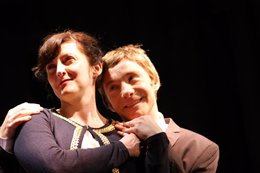When Tom Murphy’s The Last Days of a Reluctant Tyrant premiered at the Abbey Theatre in June 2009, it was difficult to divorce the play from its immediate context. Exploring greed, corruption, and religious hypocrisy, the script seemed to offer devastating parallels with Ireland’s sudden economic collapse and the chronicle of systematic child sexual abuse by the Catholic Church anatomised in the Ryan Commission report. The tenor of An Taibhdhearc’s Irish language production (with English surtitles) of The Last Days of a Reluctant Tyrant, staged as part of this year’s Galway Arts Festival, confidently shifts the play’s focus from the political to the familial but fails to compel.
Set over a 10 year period in mid-nineteenth-century Russia, Murphy’s script is “inspired” by Mikhail Saltykov-Shchedrin’s 1880 novel The Golovlyov Family. The plot orbits Arina, a peasant girl, whose marriage to the much older Victor elevates her to the landed class. Arina’s fierce ambition and ruthlessness has transformed the family’s dilapidated estate into a dominant power and she divides her empire between her two remaining sons. Her choice of Peter, her favourite, is the fulcrum of the play. When he savagely betrays her and destroys her family, Arina belatedly realises her failings as a public figure and mother.
 Mairéad Ní Chongaile invests Arina with marked venom. As Ní Chongaile swaggers across the stage, her feet walk so far ahead of her it seems like the rest of her body is trying to catch up. Ní Chongaile’s arch movements, encapsulated by a confrontational stance where her fists rest on her hips, bleed into her mirthless laughter and lacerating vocal delivery. When Arina insists that a sacked servant “ought to be shot,” Ní Chongaile almost spits the words across the stage. However, Ní Chongaile’s deliberately shrill enunciation and scowling facial gestures flirt with caricature. In the second act, Ní Chongaile offers glimpses of Arina’s warmth and adopts stunted movements to underscore Arina’s unravelling.
Mairéad Ní Chongaile invests Arina with marked venom. As Ní Chongaile swaggers across the stage, her feet walk so far ahead of her it seems like the rest of her body is trying to catch up. Ní Chongaile’s arch movements, encapsulated by a confrontational stance where her fists rest on her hips, bleed into her mirthless laughter and lacerating vocal delivery. When Arina insists that a sacked servant “ought to be shot,” Ní Chongaile almost spits the words across the stage. However, Ní Chongaile’s deliberately shrill enunciation and scowling facial gestures flirt with caricature. In the second act, Ní Chongaile offers glimpses of Arina’s warmth and adopts stunted movements to underscore Arina’s unravelling.
The force of Ní Chongaile’s Arina is matched by Diarmuid de Faoite’s performance as her conniving son, Peter. Initially adopting a fey, whiney delivery, de Faoite convincingly essays Peter’s nauseating piety before subverting it to reveal Peter’s lecherous sexual impulses – hauntingly suggesting an incestuous relationship with his cousin, Anna – and forensic manipulation.
Despite their relatively small parts, Dónall Ó Héalaí and Úna Ní Fhlatharta inject emotional breadth into their roles of Stephen and Anna, respectively. Ó Héalaí, as Arina’s eldest son, assuredly conveys the vulnerability beneath his character’s roguish nonchalance and wrings genuine pathos when he mourns his father’s death, while Ní Fhlatharta affectingly captures Anna’s juxtaposition of childlike playfulness and searing heartbreak. In contrast, Macdara Ó Fatharta and Cillian Ó Donnachadha present muted portrayals of Arina’s husband, Ivan, and her son, Paul, respectively, with each actor struggling to emboss aloof characters.
Dara McGee’s sparse set reinforces the production’s tone, emphasising the play’s intimacy rather than groping for national resonances, although there is little to signal the production’s period apart from Blánaid Ní Naunáin’s contemporary costumes. White curtains drape the back of the set and frame a digital screen showing pastoral images of the Irish landscape. In front of the screen is a raised walkway, by which actors enter and exit. Connected to the walkway in a V-shape are two ramps that lead down to a minimalist centre stage. The set is given extra scope by two large, upright, narrow canvasses at the extreme left and right of the stage: back lights cast actors’ silhouettes onto the canvas to invoke offstage scenes such as the birth of a baby in a bedroom.
The central motif of Anne McCabe’s direction is a series of fluently-choreographed tableaux. During these sequences, the white curtains billow as the ghosts of Victor and Stephen prowl the raised walkway; in the play’s coda, the cast – living and dead – walk in slow procession up and down the V-shaped ramps. Here, McCabe’s painterly sensibility is complemented by Matt de Búrca’s eerie lighting and Barry Duffy’s atmospheric soundscape.
However, the overall production feels strangely stilted and struggles to find its rhythm. McCabe orchestrates little tension between the characters, even at palpable turning points such as when Arina dangles her kingdom between Peter and Paul. Crucially, while the director elicits some strong individual performances, these never translate into a recognisable ensemble. The production is not helped by the decision to display the play’s surtitles on a TV screen to the right of the stage that requires non-fluent Irish speakers to constantly switch their attention between the surtitles and the stage.
In a script spiked with lines like “When people lose their sense of awe, they turn to property” and “Property, land and money. That’s all she ever thought of,” it is commendable that An Taibhdhearc swerved the temptation to exaggerate the play’s contemporary reverberations. But there is also a sense of frustration that this kinetic script – an Irish language translation (by Macdara Ó Fatharta) of an English adaptation of a celebrated Russian novel – fails to take flight. While An Taibhdhearc conjure a diligent and conscientious production, it never pulses with Murphy’s trademark restlessness or exuberance.
Brendan Daly is a freelance arts journalist and critic for publications in Ireland and the U.S.